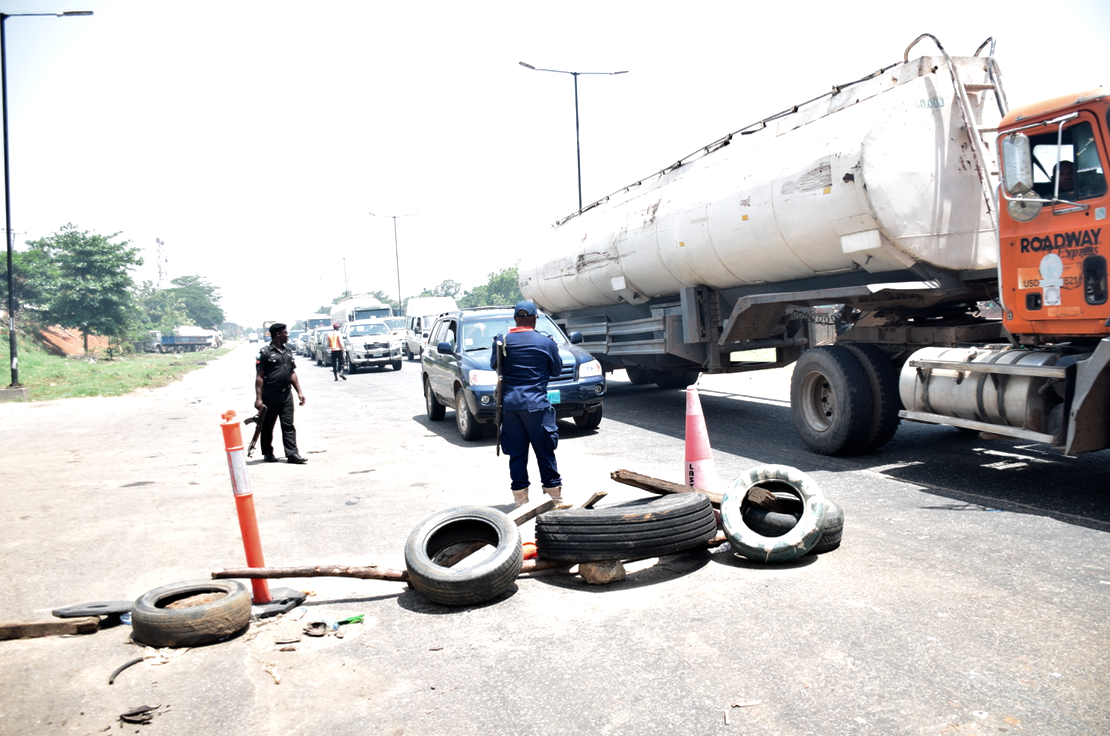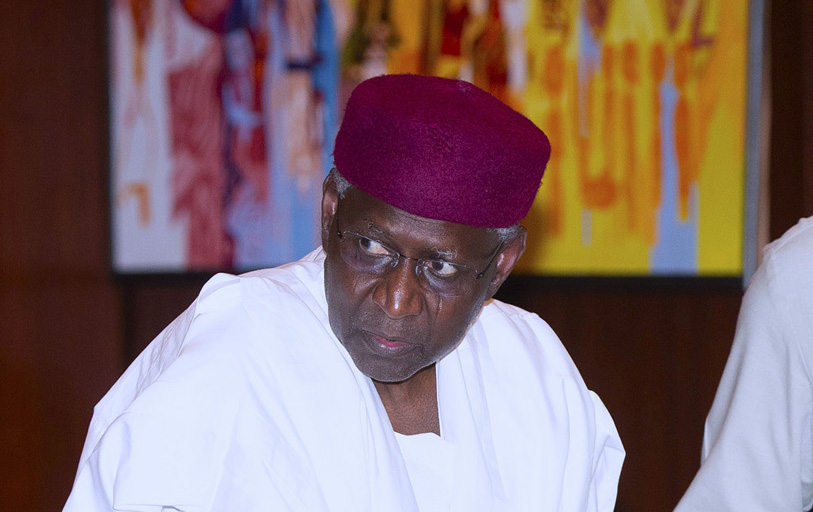Perhaps the biggest COVID-19 debate in Nigeria today is: should the lockdown be lifted? Residents of Lagos state and the federal capital territory (FCT) have been under a lockdown since March 30. The aim is to slow the spread of the virus by limiting public interactions. It was also to allow those who had contracted the virus to stay at home and manifest symptoms. It typically takes between five and 14 days for symptoms to show up. The federal government also wanted to test more Nigerians during the period. Lagos and FCT were picked because they had most of the confirmed cases. Ogun state was included five days later. Many governors have also locked down their states.
The night the lockdown started, the Nigeria Centre for Disease Control (NCDC) reported a total of 131 confirmed cases and two deaths. There were 81 cases in Lagos, 25 in FCT and three in Ogun. As of Friday, almost four weeks later, total confirmed cases had gone up to 1,095, with 32 deaths and 208 discharged. Lagos cases had hit 657, FCT 138, Kano 73 and Ogun 35. Statistics, on their own, can be deceptive. Someone could look at the figures and conclude that the lockdown has caused more cases and more deaths! The counterfactual, though, is that if we had not locked down, maybe the figures would have been double or triple or quadruple what we have today.
As the two-week extension ends tomorrow, all eyes are on President Muhammadu Buhari. Will he extend again? Will he relax things? Professor Chukwuma Soludo, the former governor of the Central Bank of Nigeria (CBN), has made a robust economic case for African countries to lift the lockdown in a widely circulated article. His argument is basically that the continent cannot afford to copy advanced countries. Africa’s economy is fundamentally informal and the governments do not have the resources to pay their citizens to stay at home as the US and EU countries are currently doing. There could be a socio-economic disorder in Africa if these lockdowns continue.
Yet, on the basis of evidence, a strong argument can be made in favour of lockdowns. Wuhan, the Chinese city that afflicted the world with the novel coronavirus, was under lock and key for 76 days and is now virtually free of the disease. In fact, China itself has not reported a single death in the last eight days and new infections are now in single or double digits for most days. Italy and Spain were badly hit but are finally flattening the curve after lockdowns. Greece, next door to Italy, offers a good success story. It started locking down in February before recording a single death. It now has a total of 2,490 cases and 130 deaths. In contrast, Italy has over 26,000 deaths and Spain almost 23,000.
Advertisement
Indeed, we can argue that countries that did not quickly adopt the lockdown option are now paying a heavy price. The US is the most pathetic. It has about one million cases and recorded over 52,000 deaths after leaving its borders open for much too long as the pandemic travelled round the world. You may argue that given the population of the US, the confirmed cases and the death rate are not as bad as they appear but if President Donald Trump had been more decisive in February, Americans could have been spared some agony. The UK was also slow in locking down, choosing to pursue its famous “herd immunity” option. It now has over 20,000 deaths.
Nigerians are getting restless over the lockdown. As things stand, only the well-to-do can cope. They are well-resourced to stay at home. They live in spacious houses, meaning they can really do physical distancing even at home. Their food stores are well loaded and can keep getting replenished for weeks and months. They have the savings to keep running their lives at least for the foreseeable future. For the poor, who are in the vast majority, everyday they stay at home makes them sink deeper into poverty. The self-employed traders, bus drivers, mechanics, barbers, tailors, hair dressers and bricklayers cannot afford to be home endlessly. They are crying.
The poor welfare delivery system in Nigeria has made it difficult to have an organised way of providing palliatives. Unlike in advanced societies where databases are comprehensive, our attempts to target the poor for direct transfers started not too long ago, possibly with Owo Arugbo (old people’s stipend) in Ekiti state in 2012. The social investment programme (SIP) of the federal government later came on board. These are limited to the extreme poor and clearly inadequate to reach the informal sector as well as those who depend on daily takings for survival. Above all, the government is broke and needs palliatives itself. So we are in a terrible corner.
Advertisement
What then? Should the lockdown be lifted for Nigerians to revive their economic lives so that we can avoid a certain social disorder ahead of us? I will argue that from what I have learnt about the behaviour of the coronavirus so far, lockdowns are effective — but they cannot be sustained, not in Nigeria where the bulk of the population are self-employed and the government is not buoyant enough to “pay them to stay at home”, as Soludo put it. More so, with confirmed cases going up on a daily basis, we may have to make certain assumptions and accept certain conditions in whatever strategies we decide to adopt to tackle this destructive and disruptive pandemic.
There is a basic assumption we have to make in fashioning out the way forward. That is, until there is a solution in form of cure or vaccine, we will continue to record new cases and deaths, lockdown or no lockdown. We are still nowhere near getting the vaccine or treatment. Trials are ongoing, but the most optimistic projections still indicate that we may have to wait till 2021 for the vaccines to be available for general use. Now you would agree with me that we cannot keep Nigeria locked down till 2021. We cannot even afford it. Most of those who are comfortable today may also run out of resources if this lockdown lingers much longer. The lockdown needs to be strategically reviewed.
So, these are my thoughts. Bearing in mind that there will continue to be new cases and deaths, what we should aim at now is slowing things down as much as possible. One, it’s been proved statistically that the elderly and those with underlying medical issues are the ones most likely to die from the disease. In the meantime, we must aim to protect these categories as a matter of priority. Protection could come in form of keeping them isolated or physically secure while targeting them with palliatives. Efforts should be concentrated on identifying the vulnerable and managing their health and safety so that infections among them can be kept at the minimum.
Two, since most people who catch the virus will survive in any case (in Nigeria, only 3 in 100 infected persons will die), we must roll out a programme to boost the immunity of Nigerians. We currently give immunisation and certain drugs free of charge. We can begin to give immunity-boosting drugs for free as well. This will prepare our bodies to fight the infection while we await the final solution. Nigerians should be vigorously educated on the fruits, foods and leaves that boost immunity. This should be the subject of mass orientation. If we do this successfully, we will be able to reduce infections and improve survival rates among the not-so-vulnerable Nigerians who catch the virus.
Advertisement
If we decide to lift the lockdown to reopen the economy, we should continue with strict social distancing rules: eateries must sell only take-away; no handshakes; no hugs; and religious/social gatherings should be limited to certain numbers with adequate spacing. We should continue with other hygienic measures: no spitting in public; no shouting (because of the droplets); frequent hand washing; use of hand sanitizers; and proper use of face masks in public, among others. Remember there will still be new infections; all we can do now is slow things down until a solution is found. If we keep the vulnerable safe and boost the immunity of Nigerians, we can slow down the virus.
Also, government must do a number of things: make testing readily available so that the infected can go into quarantine; increase bed spaces at isolation centres; and engage more frontline health workers and pulmonologists for critical cases. We have to be realistic: we cannot sustain the lockdown. As a result, we must ask ourselves: how do we make sure fewer people get infected when the lockdown is lifted? How can we protect Nigerians who have underlying medical issues? How can we build the immunity of Nigerians against the virus? How can we improve hygienic practices? Since most who get infected will survive, we will have to lift the lockdown sooner than later.
However, let us keep this in mind: whatever decision we take, there will be trade-offs. If we continue the lockdown, we will be in a better place to control community spread. We can intensify testing and treatment. But the poor people will continue to suffer and the economy will keep taking the hit. If we lift the lockdown, the economy will start to pick up and people’s livelihood will bounce back. But there is a danger: what if new infections get out of hand? For a country of 200 million people with highly limited healthcare facilities, the consequences of an explosion will not be pleasant. Whatever decision the federal government eventually takes, let it be based on sound reasoning and advice.
AND FOUR OTHER THINGS…
LOVE AND HATE
Advertisement
I was overwhelmed by the reactions to my article on Mallam Abba Kyari, the late chief of staff to President Buhari, last Sunday. Most people spoke along the same line: “Thank you, Simon… I never knew the man beyond the bad things being said about him…” Of course, a lie can travel for a thousand years, but the truth will always catch up. As the eulogies are being poured on Kyari home and abroad, it still hurts me that he will never be able to tell his own story. Regardless, those for and against him should continue to feel free to say their minds. It’s part of their fundamental human rights. In the end, you can’t be loved by everybody — just as you can’t be hated by everyone. Life.
CHIEF OF STAFF
Advertisement
There has been a lot of speculation as to who will be the next chief of staff. Caution. That you are chief of staff does not mean you will have enormous influence on the president. The president determines whom to trust with power. The person with the biggest influence on President Olusegun Obasanjo was a personal aide, not the chief of staff. For President Umaru Musa Yar’Adua, it was an adviser. For President Goodluck Jonathan, it was a minister. Under Gen. Sani Abacha, it was the secretary to the government that initially ran things before his chief security officer took the stage. Being chief of staff does not automatically confer you with trust and influence. Fact.
TOUGH TIMES
Advertisement
May I seize this opportunity to implore Nigerians to fasten their seat belts — there is serious economic turbulence ahead, caused mainly by the pandemic. Crude oil, our livewire, is in dire straits. We needed it selling at around $70 per barrel to be more comfortable but it is going for $25. Worse still, we don’t have anybody to buy the oil and that means we will have to stop producing. With crude oil prices down, forex inflow will drop, foreign reserves will dip, federation allocation will be badly hit (watch out from July) and government will struggle to pay salaries. I forgot to talk about the value of the naira — which cannot be sustained with the current level of forex inflow. Damn!
RICE KILLER
Advertisement
There is always an odd story coming from Kano state these days. Tiamin Rice Ltd practically accused the state government of playing politics by shutting its milling plant on the excuse that it was “disturbing” COVID-19 patients. “There are nearly 30 rice mills operating in Kano state, but Tiamin Rice Limited is the only company affected by the order, despite its distance of over 20km from the isolation centre at Sani Abacha Stadium,” it said. The mill produces 320 metric tonnes of rice daily and employs 223 workers full-time and 100 part-time. If indeed the closure is political, the state government should seriously consider the implications for the economy. Important.
2 comments








I really don’t think it’s yet time for this lockdown to end in Nigeria. The confirmed corona virus cases in the country has escalated quickly to over 1000+, what do you think it will be if there was no lockdown,? As for the less privileged, foodstuff and money should be provided for them.
Thanks for the breakdown